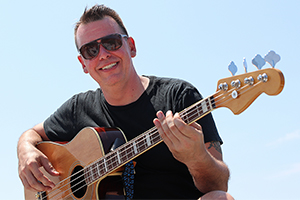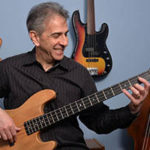Is there a better way to play that? (I bet there is!)
By Jon Liebman
December 23, 2022
How long have you been playing bass? Are you brand new to the instrument or are you a badass?
Maybe you’re somewhere in between.
Regardless of what level bass player you are, there’s always something new to try, often leading to discoveries you never thought of.
Some people describe the bass as a “beast” of an instrument. Once you get into it, though, it’s not nearly as overwhelming as people make it out to be, if you take the right approach.
I was having a conversation with Lincoln Goines recently for this week’s FBPO interview. Lincoln’s played bass with everyone from Dizzy Gillespie to Carly Simon. He’s also been teaching bass for many years as a longtime faculty member at Berklee College of Music.
Naturally, when I asked Lincoln what advice he had for someone who wants to learn bass, he had a lot of good stuff to offer.
Make sure you’re learning the right way
Lincoln started with a few encouraging words for anyone who might think they’re too old to learn bass. “First of all,” he says, “it’s never too late to start playing bass. Never too late.”
He then talked about the importance of having a good teacher in order to you help you avoid bad habits and get results quicker and more easily.
“If you’re going to learn how to play the bass,” Lincoln says, “go get a teacher. Period. Go on For Bass Players Only. Get some of the elementary lessons and adhere to it because you’re not going to be able to figure it out by yourself.”
Then, once you’re on your way, the learning process never stops. There’s always something new to learn on the bass.
“I’m still looking for teachers,” Lincoln says. “I’m picking brains. I’m picking everybody’s brains. I’m picking my students’ brains.”
Economy of motion
Lincoln’s biggest point was about making efficient movements with your hands and getting the job done without working any harder than you have to.
“It’s all about comfort,” he says. “Economy of motion will save you a lot of work and make your playing more efficient.”
As you may have already discovered, in nearly every case there’s more than one way to get from A to B. The more time you spend playing and experimenting with the bass, the more you’ll find new ways to approach whatever it is you want to play.
“If you’re going to play something on the bass,” Lincoln says, “figure out a way to play it so you don’t have to move your hand around and be uncomfortable. There’s a way of getting around a scale, there’s a way of getting around a pattern where your hand can remain comfortable.”
It works for both the easy stuff and the hard stuff
No matter what you’re learning on the bass, no matter how easy or difficult it is, take the time to dissect it till you find the most efficient movements for both your left hand and your right.
“There are fingering options, especially on the electric bass,” Lincoln says, “that you can afford the best economy of motion once you know what the pattern is, or the line, or the etude that you’re playing. Find the most efficient way to play it.”
It doesn’t matter if it’s a scale, a Paul McCartney groove, or a complicated bebop line. There’s almost always more than one way to play it.
“I spend a lot of time with students,” Lincoln says. “I spend a lot of time with myself, going back to something, a Charlie Parker head, whatever, and figuring out, ‘This is a better way to play this!’”
“It’s not that complicated,” he says, “but it takes time. It takes dedication.”
Even for the most seasoned bass players do it
“I talked with Ron Carter about this too,” Lincoln says. “He’s still figuring out how to play scales on the bass and he’s all into economy of motion too.”
Yes, even Ron Carter. With the legacy he’s built, it’s easy to think of Ron as having it “all figured out,” yet he’s forever focused on playing bass as efficiently as possible.
“You ever see him play a B flat scale and not even move his hand?” Lincoln asks. “Here’s a guy who’s 85 years old who still plays the bass like he’s 19. And a lot of that has to do with finding the most efficient system for playing scales, for playing patterns.”
What about you?
Think about how you can apply this concept to your bass playing. What are you working on? Are you diligently learning your scales and modes? Are you in a band playing tunes you’ve played a hundred times before?
Take a step back and question your approach. Examine your hand movements, your fingerings. Might there be a better way to play it? I bet there is. Leave a comment below and share your story. And be sure to watch my interview with Lincoln here.






Great topic! When you nail economy of motion it almost feels like cheating 😅. Garry Willis is another good one to watch in this regard.
Glad you liked it, Grayden. Thanks!